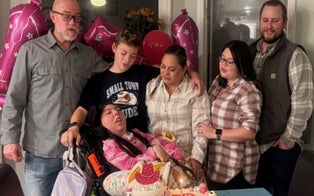A poll revealed that after a cancer diagnosis, nearly a third of patients and survivors want a new career.
The relief that comes with successfully battling cancer can be short-lived for some, as many face the reality of returning to work.
After undergoing a life-changing event, it would seem natural that patients and survivors want to return to their normal routines— but for some, going back to their old workplace just doesn’t appeal.
“I definitely think it totally makes perfect sense… that lots of people, when faced with something that challenges their health and mortality… look at what their work life is and what they’d like it to be,” cancer workplace issues expert Rebecca Nellis told InsideEdition.com.
Having faced their own mortality, many survivors can’t reconcile spending all their time in a job that isn’t totally gratifying, said Nellis, who serves as CMO of Cancer and Careers, a nationwide nonprofit that has helped thousands of people who have been diagnosed with cancer get back on their feet.
According to a Harris Poll on behalf of Cancer and Careers, 31 percent of patients and survivors find themselves seeking a new career.
Of those polled who said they were looking for a new line of work, 33 percent said their interests had changed.

Rebecca Nellis (Cancer and Careers)
“’What about the rest of my life?’” Nellis said people ask. “Work is such a big component of that.”
It took Jasan Zimmerman more than two decades and three battles to finally be rid of cancer, but it would take many more years until he could finally say he was happy with his life.
He ultimately had a dramatic switch in careers -- from working as a molecular biologist at a biotech lab to joining the staff at a children's hospital.
Read: Mom Proudly Showing Breast Cancer Scars Will Walk 1,000 Miles Topless
“It wasn’t like an epiphany for me; it was a long term process,” said Zimmerman, who was first diagnosed with neuroblastoma when he was 6 months old.
It was likely the treatment that saved him when he was a baby caused the cancer found in his thyroid when he was 15, and again at 21.
“When I was growing up, I didn’t really have a sense… of how heavy it was. When I was 15, it really hit me,” he told IE.com. “I went into a deep depression for 10 or more years. I didn’t want to talk about it. I finished college, had my second treatment, went to grad school and started working.”
Zimmerman moved to the San Francisco Bay Area in 2000 and worked as a molecular biologist in a biotech company’s lab, as he had always had an interest in science.
“I was in a perpetual bad mood. I finally realized ‘I think I’m depressed’ and I took steps to work on that,” he said.
He found comfort in an adolescent support group and after a year of meetings, he finally opened up about his experience.

Jasan Zimmerman (Cancer and Careers)
“I realized there are opportunities to give back; that kind of got me on my path,” he said.
Zimmerman returned to school, getting a Master’s degree in non-profit administration in 2010. Halfway through his 27-month program, he was laid off from his job at the lab.
“It kind of freaked me out… but the layoff was kind of one of the best things that ever happened to me,” he said. “It forced me to move my timeline up.”
Utilizing Cancer and Careers’ resume review service, Zimmerman narrowed down his focus on what he wanted to do and eventually found a position at the Lucile Packard Children’s Hospital, where he now serves as an assistant director.
“The work is just so close to my heart … I didn’t even realize or understand how important that was until I started at the Packard Foundation,” he said. “Such a weight was lifted when I started at this place."
Surviving cancer can also refocus a person’s priorities.
Tara Cernacek was diagnosed with stage II breast cancer at the age of 42 in 2012. She continued to work as an executive assistant at a nonprofit while undergoing chemotherapy, radiation therapy and two surgeries, but found herself without a job a year into an 18-month-long treatment when her company restructured.
“There was a sense of panic,” the Brooklyn resident told IE.com. “I thought ‘how can I interview for any jobs looking the way I do?’ I had no hair… but I needed flex care.”
She focused on her health and recovery for six more months before jumping back into the job market, turning to Cancer and Careers to recraft her resume and seek advice from a career coach.
“Before I had a diagnosis… I used to think ‘why would anybody … be worried about their job and not spending quality time with their families?' But having a job gave me a sense of normalcy. I really wanted to work," she said.
After a series of temporary jobs, Cernacek began working in August 2015 at the nonprofit Women’s City Club of New York. Happy to be back at work in a field she cared about, Cernacek said the company allows for a work-life balance that was harder to attain in her old position.
“I knew that I still wanted to work in a place that was doing something and making a difference for people,” she said. “But I didn’t want a 24/7 Blackberry position; I wanted a better work life balance. What (cancer) did… it made me realize how time can be short.”
Cernacek is not alone in her new take on life. A third of cancer survivors who told the Harris Poll that they were looking for a position in a new line of work also said their previous fields required too many hours.
Read: Cancer Surviving Teen Doesn't Stop Being a Gymnast Even with One Leg
“We do see a lot of people who move away from that corporate 100-hour-a-week job,” Nellis said.
“We encourage people to think about what they really mean by getting meaning out of their job,” she continued, saying that can take on a different meaning for every person.
In 2011 at just 31 years old, Ashley Thompson, a young single mom, was diagnosed with kidney cancer.
“Things were coming at me fast and quick,” she told IE.com. “While it was a really supportive (work environment), one of the reasons I decided to leave, was I felt I had become the cancer girl.”
Cancer and Careers helped Thompson determine what she needed out of an employer and how to discuss those needs, she said.
Describing her old position as “glorified data entry,” Thompson made a switch within the educational testing field to become a product administrator, working in an innovative sector.
“Now I feel like I’m making a difference in my job,” she said.
That feeling of contributing to something became exponentially more important after fighting cancer, said the Texas mom, who in May will mark five years in remission.
“Your priorities change,” she said. “(You ask), 'are you in the right job? Are you valued? Are you doing the things in your life that you want to do?' By switching careers… it kind of empowered me. I took control.”
Maintaining authority of one’s own life is a top priority for many cancer survivors, and that can begin in the workplace.
“We want people to make good decisions, to have as much information as possible … we want to help them think about the hard parts of this, so that they have the best chance to create the circumstances they want,” Nellis said. “They’re savvy (job) candidates, not savvy cancer survivor candidates.”
Though not a person’s entire identity, cancer survivors cannot help but be affected by their journey. It’s up to that person to turn the negative into a positive, Zimmerman said.
“I always hear people say ‘I had cancer and it was the greatest thing to ever happen to me, I learned so much.’ For me that’s not true,” Zimmerman said. “I wish I didn’t… but either way, once you’re finished with treatment, you have this new lease on life… you have this chance to be in a place that makes you happy. Life is short and there’s not a lot of time to for negativity.”
Watch: Man Defies Odds by Beating Cancer and Surviving a Skydiving Accident






